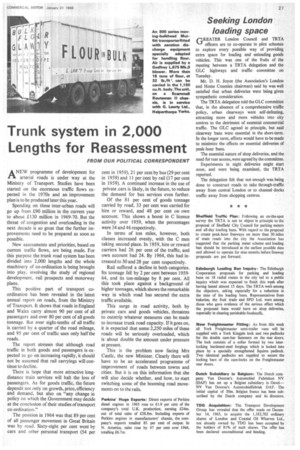Seeking London loading space
Page 29

If you've noticed an error in this article please click here to report it so we can fix it.
aREATER London Council and TRTA
officers are to co-operate in pilot schemes to explore every possible way of providing extra space for loading and unloading goods vehicles. This was one of the fruits of the meeting between a TRTA delegation and the GLC highways and trafficcommittee on Tuesday.
Mr. D. H. Joyce (the Association's London and Home Counties chairman) said he was well satisfied that urban deliveries were being given sympathetic consideration.
The TRTA delegation told the GLC committee that, in the absence of a comprehensive traffic policy, urban clearways were self-defeating, attracting more and more vehicles into city centres to the detriment of essential commercial traffic. The GLC agreed in principle, but said clearway bans were essential in the short-term. In the longer term, efforts would have to be made to minimize the effects on essential deliveries of peak-hour bans.
The essential nature of shop deliveries, and the need for rear access, were agreed by the committee.
Experiments in night deliveries might start soon, and were being examined, the TRTA reported.
The delegation felt that not enough was being done to construct roads to take through-traffic away from central London or to channel docks traffic away from shopping centres.
Sheffield Traffic Plan: Following an on-the-spot survey the TRTA is not to object in principle to the proposal of Sheffield City Council for parking meters and all-day loading bans. With regard to the proposal to create peak-hour freeways on more than 30 miles of main roads into the city the Association has suggested that the parking meter scheme and loading ban should be introduced at the earliest possible date and allowed to operate for nine months before freeway proposals are put forward.
Edinburgh Loading Ban Inquiry: The Edinburgh Corporation proposals for parking and loading bans on 18 radial routes in the city led to a public inquiry which was expected to finish this week after having lasted almost 15 days. The TRTA were among the objectors, asking especially for a reduction in the time of the loading bans. Representatives from bakeries, the fruit trade and SPD Ltd. were among those who gave evidence of the serious effect which the proposed bans would have on shop deliveries, especially in clearing perishable foodstuffs.
New Freightmaster Fitting: As from this week all York Freightmaster semi-trailer vans will be supplied with a York Kingpin lock and two padlocks for the double cam-bar fasteners on the rear doors. The lock consists of a collar formed by two interlocking hardened-steel forgings which is locked into place by a specially strengthened Squires padlock. Two identical padlocks are supplied to secure the locking bars of the cam-locks on the Freightmaster rear doors.
Dutch Subsidiary in Belgium: The Dutch company Van Doome's Automobiel Fabrieken NV (DAF) has set up a Belgian subsidiary in OevelNV Van Doorne's Automobielfabriek DAF. The initial capital of 50m. Belgian francs has been subscribed by the Dutch company and its directors.
TDG Acquisition: The Transport Development Group has revealed that the offer made on December 14, 1965, to acquire the 1,182,702 ordinary shares of London and Coastal Oil Wharves Ltd., not already owned by TDG has been accepted by the holders of 81% of such shares. The offer has been declared unconditional and binding.




















































































































